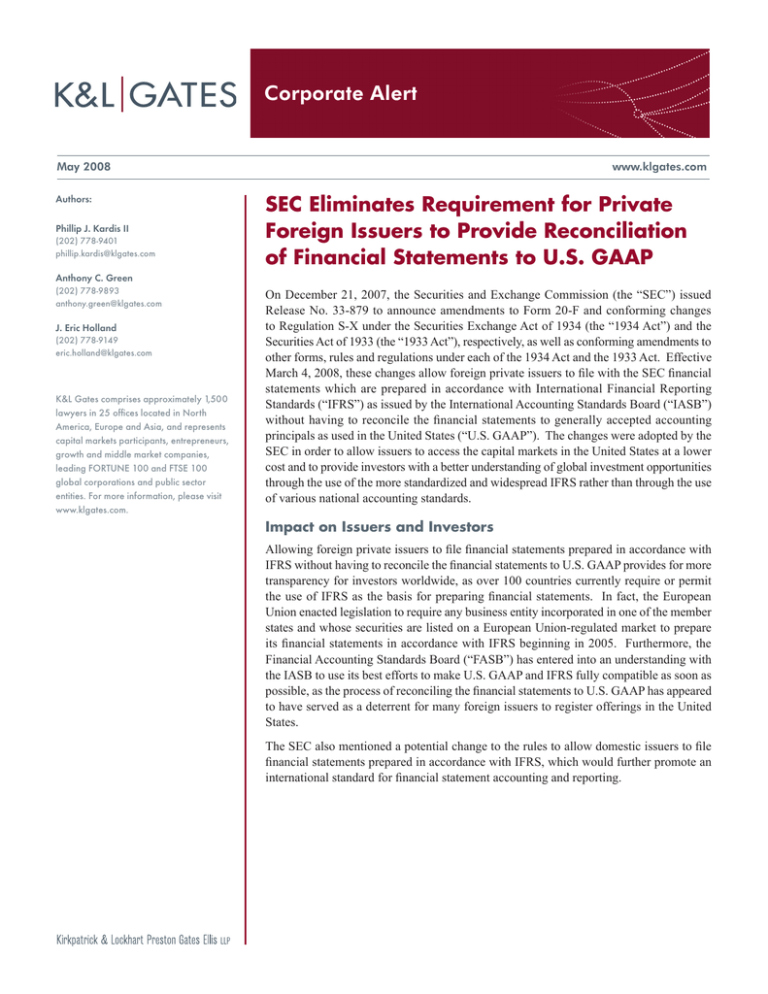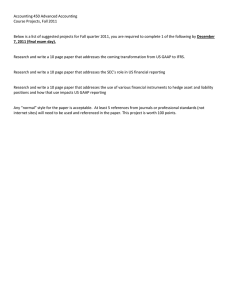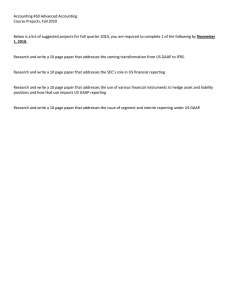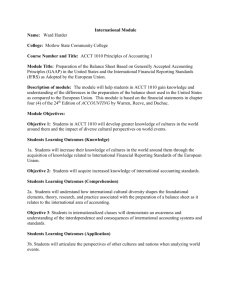
Corporate Alert
May 2008
Authors:
Phillip J. Kardis II
(202) 778-9401
phillip.kardis@klgates.com
www.klgates.com
SEC Eliminates Requirement for Private
Foreign Issuers to Provide Reconciliation
of Financial Statements to U.S. GAAP
Anthony C. Green
(202) 778-9893
anthony.green@klgates.com
J. Eric Holland
(202) 778-9149
eric.holland@klgates.com
K&L Gates comprises approximately 1,500
lawyers in 25 offices located in North
America, Europe and Asia, and represents
capital markets participants, entrepreneurs,
growth and middle market companies,
leading FORTUNE 100 and FTSE 100
global corporations and public sector
entities. For more information, please visit
www.klgates.com.
On December 21, 2007, the Securities and Exchange Commission (the “SEC”) issued
Release No. 33-879 to announce amendments to Form 20-F and conforming changes
to Regulation S-X under the Securities Exchange Act of 1934 (the “1934 Act”) and the
Securities Act of 1933 (the “1933 Act”), respectively, as well as conforming amendments to
other forms, rules and regulations under each of the 1934 Act and the 1933 Act. Effective
March 4, 2008, these changes allow foreign private issuers to file with the SEC financial
statements which are prepared in accordance with International Financial Reporting
Standards (“IFRS”) as issued by the International Accounting Standards Board (“IASB”)
without having to reconcile the financial statements to generally accepted accounting
principals as used in the United States (“U.S. GAAP”). The changes were adopted by the
SEC in order to allow issuers to access the capital markets in the United States at a lower
cost and to provide investors with a better understanding of global investment opportunities
through the use of the more standardized and widespread IFRS rather than through the use
of various national accounting standards.
Impact on Issuers and Investors
Allowing foreign private issuers to file financial statements prepared in accordance with
IFRS without having to reconcile the financial statements to U.S. GAAP provides for more
transparency for investors worldwide, as over 100 countries currently require or permit
the use of IFRS as the basis for preparing financial statements. In fact, the European
Union enacted legislation to require any business entity incorporated in one of the member
states and whose securities are listed on a European Union-regulated market to prepare
its financial statements in accordance with IFRS beginning in 2005. Furthermore, the
Financial Accounting Standards Board (“FASB”) has entered into an understanding with
the IASB to use its best efforts to make U.S. GAAP and IFRS fully compatible as soon as
possible, as the process of reconciling the financial statements to U.S. GAAP has appeared
to have served as a deterrent for many foreign issuers to register offerings in the United
States.
The SEC also mentioned a potential change to the rules to allow domestic issuers to file
financial statements prepared in accordance with IFRS, which would further promote an
international standard for financial statement accounting and reporting.
Corporate Alert
“Foreign Private Issuer”
Requirements
• Provide an unqualified auditor’s report that opines on IFRS compliance; and
Companies wishing to file financial statements prepared
in accordance with IFRS without having to reconcile
the financial statements to U.S. GAAP must meet the
definition of “foreign private issuer” under Rule 3b-4
of the 1934 Act, which requirements include:
•
• The company must be incorporated outside of the United States;
A private foreign issuer which uses an accounting
standard other than IFRS or is not wholly compliant
with IFRS will still be required to reconcile its financial
statements to U.S. GAAP.
• U.S. residents may not hold a majority of the shares
of the company;
• If U.S. residents do hold a majority of the shares of
the company:
• the majority of the directors and officers of the company cannot be U.S. citizens or residents;
• the administration of the company’s business must be performed outside of the United States;
and
• the majority of the company’s assets must be located outside of the United States.
Summary of Amendments/Eligibility
to File Financial Statements in
Accordance With IFRS
In order for a foreign private issuer to file financial
statements prepared in accordance with IFRS as issued
by the IASB without reconciliation to U.S. GAAP, it
must:
• Be a foreign private issuer under Rule 3b-4 of the 1934 Act as described above and eligible to file on Form 20-F;
•
State explicitly and unreservedly in the notes to its financial statements that such financial statements are in compliance with IFRS as issued by the IASB;
Fully comply with International Accounting
Standard 34 in order to qualify to file financial statements for interim periods without reconciliation
to U.S. GAAP (and without providing disclosure
under Article 10 of Regulation S-X).
An eligible private foreign issuer filing its financial
statements prepared in accordance with IFRS will
also still be required to provide specific disclosure
items in its SEC filings which make reference to FASB
interpretations or other components of U.S. GAAP, as
the SEC views these disclosure items as supplementary
information which would be included in an unaudited
footnote to the issuer’s audited financial statements
and would not ordinarily be required to be disclosed
under IFRS. Furthermore, to the extent that the IFRS
pronouncements are not definitive or allow issuers to
look to other accounting standard-setting organizations
with respect to a particular issue, an eligible private
foreign issuer filing its financial statements prepared
in accordance with IFRS must consult SEC guidance
provided in SEC Accounting Series Releases, Financial
Reporting Releases and Staff Accounting Bulletins in
making determinations in such instances.
In an effort to encourage the adoption of IFRS, the
SEC has also extended indefinitely the two-year
accommodation contained in General Instruction G
of Form 20-F to all first-time adopters of IFRS as
issued by the IASB. This extension permits a first-time
adopter of IFRS as issued by the IASB to file only two
years of its audited financial statements, rather than
three years of its audited financial statements.
May 2008 | 2
Corporate Alert
The amendments and changes adopted by the SEC
will be applicable to annual financial statements for
financial years ending after November 15, 2007, and to
interim periods within those years, that are contained
in filings made after March 4, 2008.
The SEC’s complete release on the amendments to
the 1933 Act and the 1934 Act may be found at http://
www.sec.gov/rules/final/2007/33-8879.pdf.
This Corporate Alert does not purport to address all of
the requirements or issues raised by the amendments to
the 1933 Act and the 1934 Act. If you wish to obtain
more information, please contact your relationship
lawyer or one of the authors of this article listed on
the front page.
K&L Gates comprises approximately 1,500 lawyers in 25 offices located in North America, Europe and Asia, and represents capital markets
participants, entrepreneurs, growth and middle market companies, leading FORTUNE 100 and FTSE 100 global corporations and public sector
entities. For more information, visit www.klgates.com.
K&L Gates comprises multiple affiliated partnerships: a limited liability partnership with the full name Kirkpatrick & Lockhart Preston Gates Ellis LLP
qualified in Delaware and maintaining offices throughout the U.S., in Berlin, in Beijing (Kirkpatrick & Lockhart Preston Gates Ellis LLP Beijing
Representative Office), and in Shanghai (Kirkpatrick & Lockhart Preston Gates Ellis LLP Shanghai Representative Office); a limited liability partnership
(also named Kirkpatrick & Lockhart Preston Gates Ellis LLP) incorporated in England and maintaining our London and Paris offices; a Taiwan general
partnership (Kirkpatrick & Lockhart Preston Gates Ellis) which practices from our Taipei office; and a Hong Kong general partnership (Kirkpatrick &
Lockhart Preston Gates Ellis, Solicitors) which practices from our Hong Kong office. K&L Gates maintains appropriate registrations in the jurisdictions
in which its offices are located. A list of the partners in each entity is available for inspection at any K&L Gates office.
This publication/newsletter is for informational purposes and does not contain or convey legal advice. The information herein should not be used or
relied upon in regard to any particular facts or circumstances without first consulting a lawyer.
Data Protection Act 1998—We may contact you from time to time with information on Kirkpatrick & Lockhart Preston Gates Ellis LLP seminars and
with our regular newsletters, which may be of interest to you. We will not provide your details to any third parties. Please e-mail london@klgates.
com if you would prefer not to receive this information.
©1996-2008 Kirkpatrick & Lockhart Preston Gates Ellis LLP. All Rights Reserved.
May 2008 | 3



